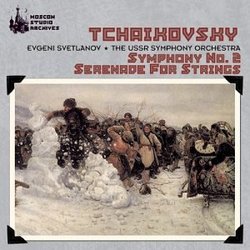Stick With The Russians!
A. Grasso | Cleveland, OH, USA | 10/26/2007
(5 out of 5 stars)
"If you like your Tchaikovsky deeply emotional and passionate, this is your recording of "Serenade for Strings."
The first movement is profoundly tragic and moving, probably my favorite section of the work. I realize that many of you may not share my point of view. If you believe that this piece is simply a paean to Mozart, then you may not like this disc. Just the same, I have heard quite a few recordings of this concert staple, and none is quite as satisfying to me as the 1967 performance by Svetlanov and the USSR Symphony Orchestra.
Maybe it's in their blood, or maybe they just happen to be great musicians with an exquisite Tchaikovsky interpreter leading them, but the aforementioned ensemble really pulls out all the stops in this rendition. Some may find the tempi slow, or ponderous. I tend to think that Svetlanov's pacing is just perfect for the melancholic Russian spirit with which Tchaikovsky is so familiar. That "sweet sadness," for lack of a better descriptor, can also be found in the slow movement of the 5th symphony, and in practically the entire "Pathetique" symphony.
Of course, unlike the final symphony of Tchaikovsky, the Serenade for Strings ends on a positive note, and a major key. In contrast to the Pathetique, there is a light at the end of this tunnel. Some recordings out there will make you think that this piece is simply an exercise in neo-Classical form. However, the recording by Svetlanov and his Soviets may make you a believer that the work is a deeper, profounder, more romantic work, which has more in common with his later symphonies than with the Divertimenti of Mozart.
Happy listening,
Adam
"
Wild Second; vivid Serenade!
Hiram Gomez Pardo | Valencia, Venezuela | 08/15/2008
(5 out of 5 stars)
"Svetlanov was, together with Mravinsky the most remarkable conductors in the vanished U.S.R.R.
But dislike Mravisnki, his approach was less intellectual and much more volcanic. The way he achieved from the orchestra these wild crescendos, astonishing fortissimos din't blur his aristocratic gaze around any single work he conducted.
In particular, in what Tchaikovsky he will never bore you, because he will have something to say: Imagination, flair, taste and superb good taste; supreme elegance and excel refinement at the moment to phrase and underline any particle of the score.
His importance since his death (2002) has been exponentially growing.
Don't miss this album.
"
Rough-shod Tchaikovsky has its appeal
Santa Fe Listener | Santa Fe, NM USA | 02/03/2008
(5 out of 5 stars)
"Svetlanov embodied the Soviet conducting style -- rough and tumble, with blatty brass, shrieky woodwinds, headlong allegros and swoony adagios. It's a blunt, direct style that almost every Russian conductor post-1989 has remodeled into something much more refined and Western. Yet when you listen to this soulful "Little Russian" performance from 1967, Tchaikovsky comes across as an earthier, more folk-inspired composer. The Sym. #2 owes a great deal to folksongs, of course, but Westeeners don't know the originals, and Svetlanov does in his bones. His rhythms are cruder, more pointed. Tempos are slower in the slow parts and faster in the fast parts than we are used to, providing a vital contrast. The woodwind choirs sound like a hurdy gurdy, a delightful effect inthis music, and of course we get the boozy-woozy Soviet horns.
I've always felt that Tchaikovsky's not-yet-mature writing in the first two symphonies needed help from the conductor, and Svetlanov feels the same. He molds and prods in ways that other conductors don't, and by eschewing false elegance, he makes the "Little Russian" sound newly authentic."

